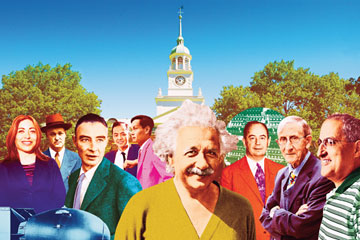
(3 of 6)
The institute's financial security and reputation are as strong as ever--but its influence in Washington has fallen, as has Washington's interest in science. Over the past 25 years, the U.S. government's spending on physical-science research has dropped by half. Sequestration--the $1.2 trillion in spending cuts in the discretionary and defense budgets over the next decade--has accelerated that, slicing budgets for agencies that support science research, like the National Science Foundation and the National Institutes of Health. The President's budget for next year calls for increased investment in science, including basic research, but his proposal has met opposition in Congress. As the U.S. retrenches, China is doing the opposite. Last year, the Chinese government significantly increased spending on basic research. On the basis of the most recent data from the National Science Foundation, China's combined public-private spending on R&D is rising at a clip of 20% each year. The U.S.'s is growing by 5%. Says technology policy expert Robert Atkinson, "We are simply making a choice to fund retirement homes instead of research laboratories."
When the government cuts research funding, basic-research projects get slammed. Industry funds only 22% of basic research to the federal government's 53%--the remainder comes from state and local governments, universities, colleges and nonprofits. And who can blame industry? Basic science can take decades to pay off--but it has also provided some of history's most important discoveries. The World Wide Web was invented as a better way for particle physicists to communicate, magnetic resonance imaging was discovered in the 1940s by physicists who were trying to understand if a nucleus had spin, and GPS resulted from the atomic clocks developed to test Einstein's theory of relativity. "I don't believe in these cases that you would have gotten where you wanted to go by thinking of the application first," says Marc Kastner, dean of MIT's school of science. "The [science] community will survive," he says, "but there will be less of these game-changing discoveries--at least in this country."
Though the famed Bell Labs fell victim to the breakup of the AT&T monopoly, there are some big U.S. business names playing in basic research, including Google and IBM, which has hired a number of institute alumni. In 1997, Microsoft turned to Jennifer Chayes, then a member at the institute, to spearhead new research groups. Chayes told Bill Gates he was crazy; the results wouldn't pay off for 100 years. Gates told Chayes, "Don't worry." Sixteen years later, Chayes has lured pure mathematicians, theoretical computer scientists and economists to labs in New York and Cambridge. "You don't tell them what they should work on. You don't tell them because it would be a crime," says Chayes. "You inspire them by letting them know about things going on in the real world, and then you look at output of the research, and you ask, Is there something here that can improve the products that we have or some IT that we should patent?"
Celebrating Irrelevance
